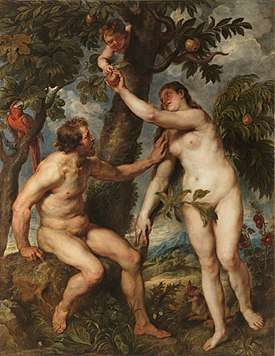Adam in Islam
Âdam or Aadam (Arabic: آدم, romanized: ʾĀdam) is believed to have been the first human and nabi (Arabic: نَـبِي, prophet) on Earth, in Islam.[1] Adam's role as the father of the human race is looked upon by Muslims with reverence. Muslims also refer to his wife, Haawa (Arabic: حَـواء, Eve), as the "mother of mankind".[2] Muslims see Adam as the first Human on Earth, as the Quran states that all the Prophets preached the same faith of Islam (Arabic: إِسـلام, 'Submission' (to God)).
'Ādam آدم | |
|---|---|
1.png) The name Adam written in Islamic calligraphy followed by Peace be upon him. | |
| Title | First person |
| Successor | Idris (Enoch) |
| Spouse(s) | Hawwā (حواء) |
| Children |
|
.jpg)
Islamic creation narrative
According to non-Qur'anic sources, before God created Adam He ordered the archangels to bring seven handful of soil from Earth for the body of Adam. Only the archangel Azrail succeeded. Azrail took dust from different parts of the earth, so that his children might have different skin colors.[3][4]
The Qu'ran states that when God informed the angels that he was going to put a successor on Earth, they questioned whether the human would cause destruction and war, but He told them that He knew what they know not.[5] God then taught Adam the "names" of all things.[6] He then tasked the angels to give the names of some things and when they failed, he had Adam inform them of what they did not know.[6][7] When God called to prostrate to Adam they all obeyed, except Iblis who refused.[8]
A widely accepted, though not Qur'anic, narration in Islamic literature says that while Adam was sleeping, God took a rib from him and from it He created Eve; however, the exact method of creation is not specified.[9] The Qur'an then says that God commanded Adam and Eve to not approach a tree in the garden of Eden, but Iblis was able to convince them to do that. They then began to cover themselves because they now knew that they were naked.[10] For this God banished Adam and Eve to earth; non-canonical Sunni hadith say that fruits were turned to thorns and pregnancy became dangerous. Non-canonical Sunni hadith also say that Adam and Eve were cast down far apart, so that they had to search for each other and eventually met each other at Mount Arafat.[9]
In Islamic theology, it is not believed that Adam's sin is carried by all of his children.[11] Hadith say that once Adam was on earth, God taught him how to plant seeds and bake bread. This was to become the way of all of Adam's children.[12] Adam continued to live for about 1000 years, though this has been a topic of debate.[12]
Significance
Adam may be seen as an archetype of humanity or as a symbol for the emergence of humankind.[13][14] According to the Islamic narrative of Adam, humankind has learnt everything from Adam. He was the first to learn to plant, harvest, and bake as well as the first to be told how to repent and how to properly bury someone.[9] God also revealed the various food restrictions and the alphabet to Adam.[12] He was made the first prophet and he was taught 21 scrolls and was able to write them himself.[12]
Adam was also created from the earth. Earth is very important to humankind, so being created from it makes them very distinct.[10] According to some Hadith, the various races of people are even due to the different colors of soil used in creating Adam. The soil also contributed to the idea that there are good people and bad people and everything in between in the world.[15] Adam is an important figure in many other religions besides Islam.[16] The story of Adam varies slightly across religions, but manages to maintain a general theme and structure.[16]
In Persian Sufi stories, Adam is sometimes titled as Adam-I-Safi or The Chosen One.[17]
Descendants
Though it is up for debate, it has been said that Eve went through 20 pregnancies with Adam, each of the births consisted of a set of twins: a boy and a girl, in other narrations it has been said that Eve went through 120 pregnancies, each was also a set of twins.[12] In Shia traditions, their first child was a girl, born alone, called ʿAnāq.[18] According to several sources, God took all of Adam's progeny from his back while they were still in heaven. He asked each of them "am I not your lord?" as read in Q 7:172 and they all replied yes.[12] For this reason, it is believed that all humans are born with an innate knowledge of God. The most famous of Adam's children are Cain and Abel. Both the brothers were asked to offer up individual sacrifices to God. God accepted Abel's sacrifice because of Abel's righteousness and Cain, out of jealousy, threw a rock at Abel, leading to the first murder in human history: the murder of Abel by Cain.[12] As Adam grieved his son, he would preach to his children about God and faith in Him.[15] When Adam's death drew near, he appointed his son Seth as his successor.[15]
Part of a series on Islam Islamic prophets |
|---|
 |
|
Listed by Islamic name and Biblical name.
|
|
|
In the Quran
The story of Adam and creation is pieced throughout the Qura'n. There are references in Surah 2, 4, 5, 7, 15, 20,21, 38 and others.
According to the Quran, God created humankind out of clay,[19] shaped it to a form and then commanded the angels to bow (submit) to Adam. Iblis (Devil) refused out of pride[20] and was banished from Jannah (Paradise).
According to the Quran, God had already decided before the creation of Adam that mankind (Adam and his progeny) would be placed on earth. Islam does not describe mankind's life on earth as a punishment, rather as part of God's plan.
"'Verily, I am going to place mankind generations after generations on earth.' They (the angels) said: 'Will You place therein those who will make mischief therein and shed blood, while we (the angels) glorify You with praises and thanks and sanctify You?' God said: 'I know that which you do not know.'"
God then teaches Adam the names of all things and assembles the angels in front of Adam so as to show them that there is more to Adam than they know, particularly the high intellectual capacity of Adam:
"And He taught Adam the names - all of them. Then He showed them to the angels and said, "Inform Me of the names of these, if you are truthful." They said: "Glory to Thee (said the angels), of knowledge We have none, save what Thou Hast taught us: In truth, it is Thou Who art perfect in knowledge and wisdom." He said: "O Adam! Tell them their names." When he had told them, God said (to the angels): "Did I not tell you that I know the secrets of heaven and earth, and I know what to reveal and what to conceal?"
God commands the angels to bow down to Adam. All obey, except for Iblis, who feels that is made from fire, should not be bowing to Adam who was made from earth. His disobedience of God's command followed by pride caused to fall out of God's favour:
"And behold, We said to the angels: "Bow down to Adam" and they bowed down. Not so Iblis: he refused He was of those who reject faith (those who are disobedient)." (2:34)
God later places Adam and Eve in the garden and tells them that they are free to enjoy of its fruits except not to come near a certain tree: (2:35)
"We said: "O Adam! dwell thou and thy wife in the Garden, and eat of the bountiful things therein as (where and when) ye will; but approach not this tree, or ye run into harm and transgression."
Satan then deceives Adam and Eve into eating of the fruits of the tree: (2:36)
"Then did Satan make them slip from the (garden), and get them out of the state (of felicity) in which they had been. We said: "Get ye down, all (ye people), with some of you having enmity towards others. On earth will be your dwelling-place and your means of livelihood - for a time."
Adam and Eve feel a lot of remorse for their actions, but God turns to Adam in mercy and consoles him: (2:37)
"Then learnt Adam from his Lord words of inspiration, and his Lord Turned towards him; for He is Oft-Returning, Most Merciful."
God then informs Adam that God will send his guidance to Adam and his progeny: (2:38)
"We said: "Get down all of you from this place (the garden), then whenever there comes to you Guidance from Me, and whoever follows My Guidance, there shall be no fear on them, nor shall they grieve."
In the Garden of Eden, Satan (often identified as Iblis) lures Adam and Eve into disobeying God by tasting the fruit from the forbidden tree. God, sends Adam and Eve out into the rest of the earth.[21][22]
The Quran also describes the two sons of Adam and Eve, Cain and Abel.[23]
See also
- Biblical and Quranic narratives
- Legends and the Qur'an
- Muhammad in Islam
- Prophets of Islam
- Stories of The Prophets
Notes
- Lalljee, compiled by Yousuf N. (1981). Know your Islam (3rd ed.). New York: Taknike Tarsile Quran. p. 71. ISBN 978-0-940368-02-6.
- Historical Dictionary of Prophets in Islam and Judaism, Wheeler, Adam and Eve
- Scott B. Noegel, Brannon M. Wheeler The A to Z of Prophets in Islam and Judaism Scarecrow Press 2010 ISBN 978-1-461-71895-6 page 13
- Oliver Leaman The Qur'an: An Encyclopedia Taylor & Francis 2006 ISBN 978-0-415-32639-1 page 11
- Qur'an 2:30.
- "Surah Al-Baqarah [2:31]". Surah Al-Baqarah [2:31]. Retrieved 2020-04-24.
- "Surah Al-Baqarah [2:32]". Surah Al-Baqarah [2:32]. Retrieved 2020-04-24.
- "Surah Al-Baqarah [2:34]". Surah Al-Baqarah [2:34]. Retrieved 2020-04-24.
- Wheeler, Brannon M. (2001). Introduction to the Quran : stories of the prophets. New York: Continuum. ISBN 978-0-8264-4957-3.
- Thorp, John (1982). "The Muslim Farmers of Bangladesh and God's Creation of the World". Asian Folklore Studies. 41 (2): 202–203. doi:10.2307/1178123. JSTOR 1178123.
- Phipps, William (1996). Muhammad and Jesus. New York: The Continuum Publishing Company. pp. 122–3. ISBN 978-0-8264-0914-0.
- al-Tabari (1989). The History of al-Tabari. New York: State University of New York Press. p. 259. ISBN 978-0-88706-562-0.
- Ingvar Svanberg, David Westerlund Islam Outside the Arab World Routledge 2012 ISBN 978-1-136-11322-2 page 3
- Shahpari, Hasan Islamic Economy and Social Mobility: Cultural and Religious Considerations: Cultural and Religious Considerations IGI Global ISBN 978-1-466-69732-4 page 179
- Kathir, Al-Imam ibn (2013). Stories of the Prophets. Fortress iPublications. ISBN 978-1-4848-4091-7.
- Michael E. Stone, ed. (1998). Biblical figures outside the Bible. Harrisburg, Pa.: Trinity Press Internat. ISBN 978-1-56338-247-5.
- https://www.academia.edu/7170404/Shaggy_or_Shaved (Scroll down to page 12) Adam was given the honorary name of "Adam-I-Safi" meaning: The Chosen One.
- Roberto Tottoli, “ʿAnāq”, in Encyclopaedia of Islam, THREE, ed. by Kate Fleet and others (first published online 2009), <https://dx.doi.org/10.1163/1573-3912_ei3_COM_22679>.
- Quran 3:59
- Quran 15:26–32
- Quran 7:19–24
- Quran 20:115–123
- Knappert, Islamic Legends, 39-40.
References
- Saad Assel, Mary (2010). 25 Icons of Peace in the Qur'an: Lessons of Harmony. iUniverse. p. 244. ISBN 978-1-4401-6901-4.
- Mehar, Iftikhar Ahmed (2003). Al-Islam: Inception to Conclusion. AL-ISLAM. p. 240. ISBN 978-1-4107-3272-9.
- Islam Kotob. Stories Of The Prophets By Ibn Kathir. Islamic Books.
- Lalljee, compiled by Yousuf N. (1993). Know your Islam (3rd ed.). New York: Taknike Tarsile Quran. p. 255. ISBN 978-0-940368-02-6.
